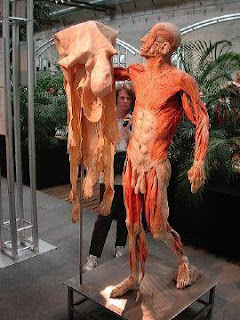But what is the halacha regarding other people? Is embalming prohibited in Jewish tradition and Halacha? Normative halacha is that embalming is absolutely prohibited; Jewish funerary tradition requires that the burial be done in a way that ensures the quick decomposition of the body. Where possible, the casket is opened on the bottom so that the body is directly in contact with the earth. The Taz in Yoreh Deiah 363 SK 3 says that as long as a person’s body remains intact his soul is troubled and restless. So what is going on here with this embalming? Why does nobody say that what was done to Yaakov was inherently wrong and inconsistent with Jewish law and tradition?
The local meforshim have several approaches.
The Mei'am Lo'eiz says that the need for decomposition to allow the spirit to rest only applies to non-tzadikim gemurim, or tzadikim non-gemurim. Tzadikim gemurim are at rest irrespective of the condition of their bodies.
The Ohr Hachaim says two answers: one is that there was an overriding need to embalm Yakov despite the cost to the neshama; because it was vital that the Egyptians not deify him when they saw his body remain unaffected by death. The second is that the concept of tzadikim not being affected by decay is only true after Mattan Torah (paskah zuhamasan). (He also says a third teretz that I don’t like.)
All the above is easily available to anyone with a good set of seforim. But there are two important points that you may not be aware of.
First Point: the whole question is not a question in the first place. The reason embalmment is anathema for Jews is because of the need, as the Taz says, to allow quick decay which will let the soul come to rest. If a tzadik gamur does not decay anyway, why on earth should you not be allowed to embalm him? It’s not as if you’re preventing decay; he is decay proof anyway. There is no need for the Mei'am Lo'eiz's answer, because there is no question in the first place. (In other words, it's muttar to embalm people, but only if they're still "alive"-- Yaakov avinu lo meis, as R' Yitzchak said from Reb Yochanan in Taanis 5b.) The only possible problem is, as Rebbi Yehuda says, that it gives people the impression that he would have decayed if not for the embalmment.
So the correct way to read this is the following:
Jews do not embalm their dead.
But this prohibition obviously does not apply to tzadikim gemurim, whose bodies would not decompose anyway. It's like ein bishul achar bishul, you should pardon the tzushtell.
Why, then, did Yosef embalm his father? What benefit is there in salting salt?
The answer is that he wanted to prevent the local idol worshipers from superstitiously attributing divinity to Yaakov upon seeing his body unaffected by death; or that the local custom was to honor the dead by anointing their bodies with perfume, which was done in actual mummification as well.
Even though Yosef was well motivated in what he did, it was a bizayon to his father because some people saw his act as proof that he was afraid that his father would have otherwise decayed, which was an insult to Yaakov's reputation as a tzadik gamur.
The Rabanan don't really argue on this point. They simply hold that Yaakov himself left instructions that he be embalmed, I assume for the same reasons attributed above to Yosef, and therefore we can't fault Yosef for the decision.
Second Point: The Tosfos Yomtov in Psachim 4:9 that says that neither cremation nor mummification is assur; both are muttar. The reason is that the result of these processes is that the remains are no longer lifelike; the body has no semblance of living material, and the process is equal to natural decay speeded up. On the contrary-- you are doing the person a favor by decreasing his wait time. This is obviously true in the case of cremation, and less obvious in the case of mummification, but that's what he says. (And in any case, he is only talking about mummification, which involves thorough dessication, not embalming; so forget about pickling Pop.) Who would have thought that the Maharal’s talmid would be mattir cremation or mummification?? Of course, the other meforshim in Mishnayos delicately indicate that they find the Tosfos Yomtov unconvincing.
For an exposition of the state of normative halachic practice, see R' Avi Shafran's article on this subject here
http://www.cross-currents.com/archives/2007/02/05/burning-issue-the-revised-version/
Let me just say that current practice frowns on cremation and embalming, for reasons ranging from the mystic to the halachic. As far as halachic, the problem is mostly that there is a mitzva to bury the dead, and burying ashes is not a fulfillment of the mitzva, so it is a bittul asei. But the fact is that most aversion to these practices is meta-halachic. And, let's not forget about the new option that marries the mortuary arts to interior decoration-- plastination! - Here's an illustration for Niddah 55a:
דבר תורה, עור אדם כי עבדו טהור. ומה טעם אמרו טמא? גזרה שמא יעשה אדם עור אביו ואמו שטיחין


No comments:
Post a Comment